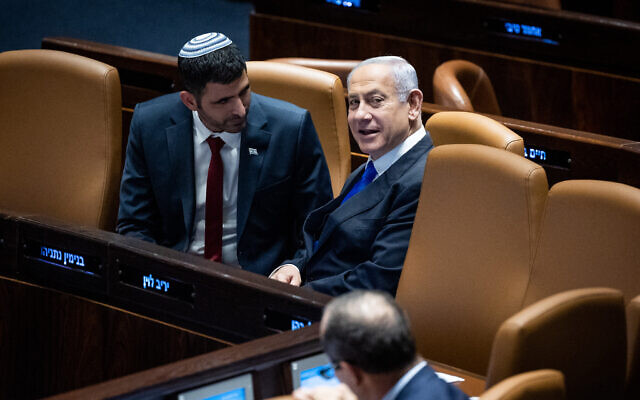



The government authorized the shuttering of the Al Jazeera news network’s operations in Israel on Sunday afternoon, in line with a law passed by the Knesset in April allowing the temporary closure of foreign media outlets deemed to be harming national security.
Immediately after the cabinet decision, hardline Communications Minister Shlomo Karhi signed four orders instructing Israel’s television providers to cease broadcasting the Al Jazeera channel, as well as instructions to close the network’s two offices in Israel, both in Jerusalem, confiscate the channel’s broadcast equipment, including cellphones; and block access to the Al Jazeera website in Israel.
“Al Jazeera’s journalists have harmed Israeli security and incited against IDF soldiers,” said Prime Minister Benjamin Netanyahu in a joint press release issued together with Karhi’s office following the government decision.
A vote on closing Al Jazeera was postponed on Thursday due to concerns expressed by the heads of the Mossad and the Shin Bet that closing the Qatari-backed channel could harm negotiations for the release of Israeli hostages being held by Hamas in Gaza, said the National Unity party after the decision was approved. Qatar, which hosts some of the Hamas leadership, plays a central role in the negotiations. National Unity ministers boycotted the Sunday vote.
Bu Karhi wasted no time in issuing the orders following the cabinet decision, and said that “megaphones for Hamas” would not have freedom of expression in Israel.
“Too much time has passed and there have been too many unnecessary legal hurdles in order to finally stop the well-oiled incitement machine of Al Jazeera, which harms the security of the state,” said Karhi after signing the orders.
“We will act immediately against those who use freedom of the press to harm Israeli security and IDF troops, and incite to terrorism at a time of war.”
In a statement to the press, the minister said that the decision was made “after supporting position papers were received and the prime minister was convinced, in accordance with the law” in reference to the law’s requirements that the security services issue professional opinions that the outlet in question poses a threat to national security.
Netanyahu and Karhi have both claimed that Al Jazeera has caused harm to Israeli national security, but the government has not publicly released evidence of this claim.
Karhi thanked Netanyahu for his “determination and support against all the odds.”
Speaking to Reuters, Walid Omary, the head of Al Jazeera in Israel and the Palestinian territories, described the government decision as “dangerous” and motivated by political rather than professional considerations, adding that the network’s legal team was preparing a response.
Under the orders issued by the communications minister, a hard-right member of the Likud party, Al Jazeera’s offices in West and East Jerusalem will now be closed down.
Karhi also ordered that cellphones, except those for personal use, be confiscated along with workstations, cameras, microphones, servers, laptops, external hard drives, video compression equipment and wireless broadcast equipment.
A separate order instructed television providers to stop broadcasting the Al Jazeera channel, and a fourth order instructed television, cellphone and internet providers to block access to Al Jazeera’s English and Arabic language websites.
An order to shut down a foreign news channel must be brought within 24 hours for judicial review by the president of a district court, who then has three days to decide whether it will go into effect as issued.
The temporary law passed in April allows foreign media networks to be shuttered for a 45-day period, which can then be renewed.
The law itself was passed as a temporary law and will expire on July 31 or earlier, if the declaration of an emergency situation is lifted by the government.
The law gives the prime minister and the communications minister the authority to order the temporary closure of foreign networks operating in Israel and confiscate their equipment if it is believed that they are “doing actual harm to state security.”
It is the communications minister who is empowered to issue such orders, but only after receiving the approval of the prime minister and the security cabinet, and after a professional position paper has been presented to the prime minister and the communications minister by the security services detailing the “factual foundations” of allegations that the channel is causing damage to Israel’s national security.
When the law allowing for foreign news outlets to be shut down was passed in April, Al Jazeera described the allegations against it as “slanderous” and said it held Netanyahu “responsible for the safety of its staff and network premises around the world, following his incitement and this false accusation.”
Although the vote in cabinet was unanimous, the National Unity party led by war cabinet minister Benny Gantz had boycotted the vote, stating afterwards that it supported the measure but that it believed the timing could harm the hostage negotiations, in reference to the position of the Mossad and Shin Bet heads.
In a statement to the press, the party alleged that Sunday’s vote “stems from political considerations.”
Economy Minister Nir Barkat described the Qatari network as “the biggest engine of antisemitism in the world,” and welcomed the decision.
“On the eve of Holocaust Day, the government is sending a strong message against the propaganda arm of the terrorist state of Qatar,” he tweeted. “We will not allow Israel’s enemies to broadcast antisemitic propaganda and blood plots from our territory.”
Sam Sokol contributed to this report.


